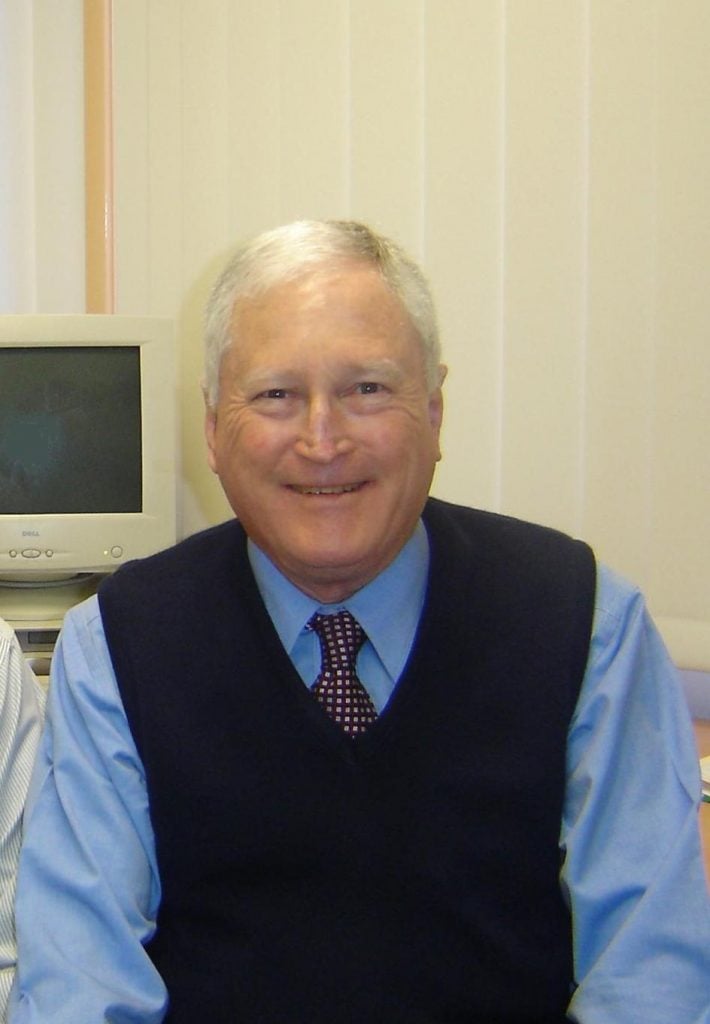
It is with great sadness that we say farewell to Richard D. Gordon, an Australian pioneer of endocrinology and hypertension research, who recently passed away after a brief illness, aged 89.
Born in Brisbane, Gordon’s training as an endocrinologist included research fellowships in Melbourne (Bryan Hudson, The Alfred and Prince Henry’s Hospitals, Monash University), Nashville, Tenn. (Vanderbilt University) under the inspirational Grant Liddle (Liddle’s syndrome, leading authority on the adrenal gland), and the University of Adelaide (Basil Hetzel). In addition to clinical work, these fellowships heavily involved laboratory bench work, setting up, validating and trouble-shooting new assays, which added an invaluable dimension to his critical judgement and expertise as a clinical scientist.
Following these fellowships, Gordon returned to Brisbane in 1970 to head the new section of the University of Queensland (UQ) Department of Medicine at Greenslopes Hospital. He established endocrine units at Greenslopes and Princess Alexandra Hospitals and a Hypertension Unit at Greenslopes Hospital which developed into an Endocrine Hypertension Research Centre. He accepted a Personal Chair in Medicine at UQ in 1982. The Greenslopes Unit achieved a reputation for meticulous diagnostic procedures, attracting referrals from throughout Queensland and other Australian centers.
With his many contributions to medicine and science, Gordon has truly earned the right to be recognized as a pioneer in all facets of hypertension, whether research, clinical practice or public awareness and education.
During over 50 years of clinical investigation, Gordon’s scientific contributions included:
- Description of the circadian rhythm for renin;
- Defining the role of the sympathetic nervous system in the regulation of renin and aldosterone in man;
- Demonstrating salt-sensitivity of a new syndrome of hypertension and hyperkalemia (Familial Hyperkalemic Hypertension or Gordon’s Syndrome, named after Gordon by Hugh De Wardener in his textbook on renal disease in 1973), and defining the varying phenotype. Research into the genetic basis of this condition led to discovery of the role of WNK kinases and ubiquitin genes in the renal regulation of sodium balance;
- Drawing attention to a variety of aldosterone-producing adenoma responsive to angiotensin, which is just as common as the unresponsive variety but previously overlooked, and describing in detail the biochemical, physiological, and histological differences between these two tumors, predicting a genetic basis for these differences, which has recently been realized by new and exciting genetic discoveries;
- Describing a new variety of familial primary aldosteronism (familial hyperaldosteronism type II) for which the genetic basis has been elucidated; and
- As a result of finding and curing primary aldosteronism in resistant hypertensives, showing that primary aldosteronism is much more common than previously thought, and the commonest potentially curable cause of hypertension.
Gordon painstakingly developed strict protocols for the diagnosis and management of primary aldosteronism which are still widely regarded as best practice today. He correctly predicted in 1992 (Lancet) that primary aldosteronism would often have a genetic basis.
Gordon’s trainees included Robert Vandongen (Personal Chair in Medicine, University of Western Australia) and Michael Stowasser, professor of medicine and director, Endocrine Hypertension Research Centre, UQ.
Gordon published around 300 scientific papers in peer-reviewed journals, and 24 chapters in texts. He completed an MD thesis (1966) entitled “Circadian rhythms in man. A transverse study of some temporal aspects of adrenocortical and renal function” and a PhD thesis (1981) entitled “Systemic arterial hypertension: adrenocorticotrophin and aldosterone in pathophysiology.”
Gordon painstakingly developed strict protocols for the diagnosis and management of primary aldosteronism which are still widely regarded as best practice today. He correctly predicted in 1992 (Lancet) that primary aldosteronism would often have a genetic basis.
Gordon was a member of the inaugural Executive Committee of the High Blood Pressure Research Council of Australia, and a member of the Endocrine Society of Australia, the Endocrine Society, and the International Society of Hypertension. He served on numerous councils and committees and founded the Queensland Hypertension Association, a not-for-profit organization consisting predominantly of lay people, dedicated toward education and research in the fight against high blood pressure.
Gordon was made an Officer in the General Division of the Order of Australia (AO) for services to medicine in the field of endocrine causes of hypertension in 1994.
With his many contributions to medicine and science, Gordon has truly earned the right to be recognized as a pioneer in all facets of hypertension, whether research, clinical practice or public awareness and education. He is survived by his wife Susan, daughters Susan, Sara-jane, and Christina, and son Michael.
Stowasser is the director of the Hypertension Unit and the Endocrine Hypertension Research Centre at the University of Queensland Frazer Institute at the Princess Alexandra Hospital in Brisbane, Australia. He is also the editor-in-chief of the Journal of Human Hypertension.

